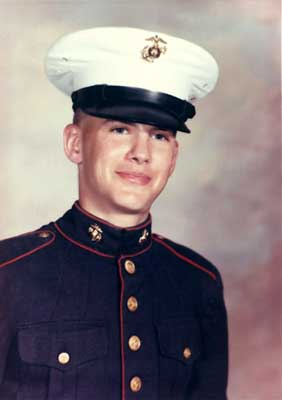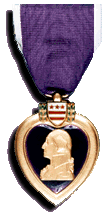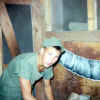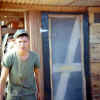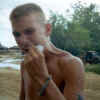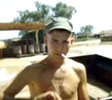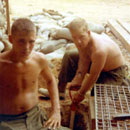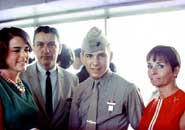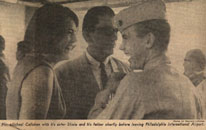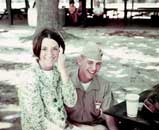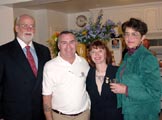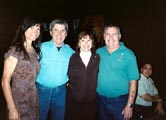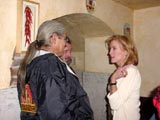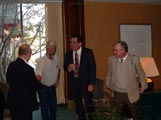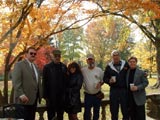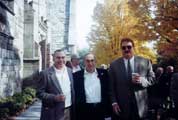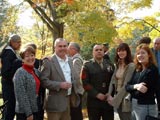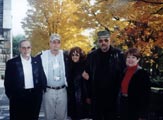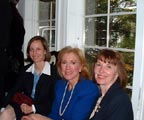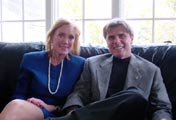PFC. MICHAEL JOHN CALLAHAN
Born on June 17, 1949
From DREXEL HILL, PENNSYLVANIA
Casualty was on Nov. 8, 1967
in QUANG NAM, SOUTH VIETNAM
HOSTILE, GROUND CASUALTY
GUN, SMALL ARMS FIRE
Panel 29E - - Line 47
Michael Callahan
(Picture courtesy of his family)Pfc. Michael Callahan served with the 3rd Battalion, 5th Marines, Mike Company, Radioman. He was Killed In Action during Operation ESSEX. His name stands proudly on the Mike 3/5 Wall of Honor. Semper fi, Brother Marine. We will never forget.
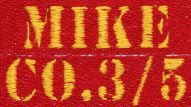
(click pictures to enlarge)
Dear Sheila, my name is Jack Swan. I was the point man for 1st platoon, Mike Co. on Operation ESSEX, 1967, when your brother was Killed In Action. Debbe Reynolds sent me the picture of you and Michael at the airport when he left for NAM. This old Marine don't mind telling you that it brought a few tears to his eyes, seeing the laughter and love that, no doubt, was within your whole family.
I knew Michael, not as a close friend, but as a Marine with a proper attitude in life. He saw well what was going on around him, and still had a sense of humor. Many men died that day, and the survivors who have made it this far in life understand that when a man falls in battle, it doesn't stop there. His loved ones back home carry on his memory. I'm sorry to hear about the loss of your Mom, Dad and Sister. You and Deirdre hold the good memories of days gone by. I'm gonna stop here before I start sounding too damn mushy. Please send a copy of this to Deirdre as I want the both of you to know that the men who knew Michael Callahan Respect and Honor the Great man he was. Semper fi, Jack
Letter written to Deirdre Callahan by Frank Jurney, M/3/5
Deirdre,My name is Frank Jurney, I served in Nam from Nov. 66/Dec 67 with Mike 3/5. I'm a close friend of Steve Cottrell, we shared the same bunker. Steve contacted me the first of April; he had been trying to find me for five years. I had not talked with any fellow Marine in 35 years. He told me of his contact with you-the web site for Michael that Debbe had put together. I was so pleased. I had a couple of pics of Michael. I've looked at the memorial site for Michael, I'm extremely moved and proud to have known such a wonderful young man. Michael had such a radiance -full of life-great personality and was a joy to be around. Everyone enjoyed his wit and his vigor for life.
The manner that Michael conducted himself, the quality person he was-any family could be proud. Having served 13 months in the infantry with many operations, my final responsibility to my unit from May to Dec. was to report to the rear after we had taken KIA's to verify and sign the certificates so our fellow Marines could go home in honor. I was not with Michael at the time of his death, but I did view his body and with the love of a brother I gave Michael the respect and honor he so deserved. I'm honored to have been his friend.
Semper fi, Frank Jurney
Letter from Sheila Callahan
I am Sheila Callahan (the sister in the photo on your website (Michael's oldest sister). Of course, my last name has been Thompson for the past 30 years. Thank you so much for contacting us. Hearing the actual story of Michael's death from his friends and comrades has been a great solace to the three of us who are still alive in the family (Sheila, Maureen & Deirdre). Needless to say, the government told us next to nothing.
It was a great comfort to know that Michael earned the respect and love of his friends. I spent years angry at God, the president, and just about every politician in Washington because I thought Michael's death was so meaningless and wrong. It is good to know that it did have some meaning. I'm sure my sister Deirdre has told you by now that my parents were killed in a plane crash just 2 years after Michael's death, and my youngest sister Pegeen drowned while a student at Boston College.
My husband is a Vietnam vet (Army medical service corps '69-'70), and our son Michael is quite the reincarnation of my brother Michael. I've asked myself if I somehow passed on his traits by just naming him after my brother. Happily, my son has made it to the age of 28 so far, so he's seen a bit more of life than my brother... Thanks again for your mail. It has brought Deirdre and I a lot of closure to hear from so many of his friends and comrades recently. It has helped to learn that not just his family knows that he was a really special guy.
The first photo is the Marine Honor Guard carrying his casket from our church. The second photo is out at Gettysburg National Cemetery as the Marines folded the flag to give to my mother. To the left of the Marine on the left is my sister Pegeen (the one that drowned at age 21). I imagine that Deirdre must actually be directly behind that Marine. Then is my sister Maureen, our Dad, our Mom and then me. The next guy is my Dad's best friend, Bob Shaw. Sheila Thompson
Pfc. Michael Callahan with his sister Sheila and his father before leaving Philadelphia Airport
Picture by Robert Latham, Philadelphia Inquirer
Newsclipping courtesy of Kevin Kelly, M/3/5 3rd Plt.
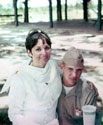
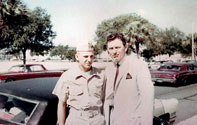
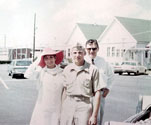
Michael and his Family shortly before he left for Vietnam
Apr. 17, 2002
By Alfred Lubrano
Inquirer Staff Writer
215-854-4969 or alubrano@phillynews.com
An undying magic
His comrades knew Michael Callahan less than two months before he was killed in Vietnam in 1967. But they could not forget the young Marine maverick, and spent more than 30 years looking for his family.
He was a bright "wild child" from Drexel Hill who joined the Marines to prove to his father he was a man. Before he could show off his new-found maturity, 18-year-old Michael Callahan was killed in the so-called Antenna Valley in South Vietnam, on Nov. 8, 1967.
For nearly 35 years, Callahan's family knew little about how he died, and even less about the indelible impression he had made on his fellow soldiers.
Last month, after more than three decades of on-and-off searching, two men who served with Callahan contacted one of his sisters and cried with her on the phone. The two put her in contact with a third buddy. And a fourth had made a similar emotional call three years ago.
Why would veterans spend more than 30 years looking for the family of a man they knew for less than two months?
There are complicated reasons, tied into Marine honor, an unfinished errand, and Callahan's charisma, a mystique he possessed that somehow stayed with these men from their war-wrecked youths into restless middle age.
Sheila Callahan Thompson and Deirdre Callahan"I was uplifted and elated that an 18-year-old boy could haunt the consciousness of all these people for 30 years," said Michael's sister Deirdre Callahan, who is organizing a memorial for her brother in November. "It's astounding Michael could move these men to search 30 years for him. That's magic."
Michael Callahan didn't follow rules, and three schools felt the need to kick him out as a result.
"It was boy stuff and he was in trouble all the time," said Deirdre, 49, a corporate attorney for SEI Investments Co. in Oaks, Montgomery County. She sat with her older sister, Sheila Callahan Thompson, in Deirdre's Merion home recently, in a formal white living room radiant with spring sunshine.
Neither sister would be specific about Michael's transgressions. What he did, they said, just doesn't matter now.
But Michael's father, James, an attorney who ran an insurance company, seemed to be angry at the boy all the time. And Michael finally decided to do something about it.
"He had a genius IQ, a wild child who wanted to prove to my dad he was responsible, a man," Deirdre said. "So he joined the Marines."
The sisters said James Callahan would blame himself for Michael's decision. "He never forgave himself," Sheila said.
Photos of Michael's final day with his family before shipping out were published in The Inquirer on Jan. 21, 1968, two months after his death. (As it happened, Maureen, another of the four Callahan sisters, dated former Inquirer photographer Robert Latham.)
In one photo, Sheila is seen laughing with Michael. She said she was trying to defuse the tension and sadness of that day, which registered clearly in the sad gaze and tight lips of their mother, Honey, whose photo also was published.
"It is a face of absolute desolation," said Sheila, 55, who runs her neurosurgeon husband's office in Waverly, near Scranton.
Once in South Vietnam, the quirky teenager made friends fast.
"I just liked him because he was really quick, smart, a little brash, with a Philly personality - braggadocious without being offensive," said Edward Blecksmith, 59, one of Michael's former commanding officers and now an executive recruiter in San Marino, Calif.
Kevin Kelly, a Levittown vocational-ed teacher, was drawn to Michael's rebel persona. "He was a magnetic-personality kind of guy," said Kelly, 55. "And he didn't go along with authority."
What Chuck Goebel remembers was the day Michael helped rig up a shower out in the boonies. "The kid was amazing," said Goebel, 55, an investigator with the Orange County, Calif., District Attorney's Office.
"In a war zone, it's grim. But if you were around Michael, you felt somehow we're going to make it through today."
The men remembered the eclectic items Honey would send Michael: one day, a large hunting knife that he treasured; the next, a Dostoyevsky novel.
None of the men could recount any specific conversation he'd had with Michael. It wasn't what Michael said that lived on after him; it's who he was that stuck.
The men also remembered Deirdre and Sheila. The sisters would write Michael sarcastic, funny letters from home, and Michael would read them to his buddies as he passed around a wine bottle that Honey had sent, cushioned within a loaf of French bread.
Men sitting in the jungle, wanting only to live through the night, would lean forward when Michael read the letters from his self-described "rowdy Irish" sisters. It reminded them there was a world beyond their hell, and they reveled in the young women's firecracker charm.
But the good times were brief, and Michael - who carried a radio for his platoon - was killed on his 49th day in Vietnam, in an ambush in Quang Nam Province, in the Antenna Valley, so named because surrounding hills impeded radio communications and required radio antennas to be raised high.
When the shooting started, Michael began crawling toward his commander, as he was trained, so the officer could radio for help. He was killed as he moved forward, recalled Steve Cottrell, 54, a Boulder City, Nev., environmental consultant who was lying next to Michael when he was hit with .50-caliber machine-gun fire.
"He was going out of his way to be brave and do his job," Cottrell said. "He died very quickly."
Michael's body returned to Pennsylvania, where the family buried him on a snowy day in Gettysburg.
About two years later, after he was discharged, Cottrell came through Philadelphia to return the knife to the Callahans, and to talk about Michael. The family was too devastated to speak with him: Only months earlier, in March 1970, Honey and James had been killed in a private-plane crash in Montgomeryville.
Cottrell didn't have a chance to give back the knife, and more years passed. He again tried looking for Deirdre without success. Unbeknownst to him, she'd married and changed her name.
Goebel and Kelly ran into similar problems in their sporadic searches. But recently, Deirdre began using her maiden name again to make it easier for old friends to find her.
Cottrell found her on the Internet in 1999, and eventually mailed Deirdre the knife. Mission accomplished. Now, Sheila's son Michael, named after his uncle, has it. "That's pretty cool," Cottrell said.
In March, Kelly, who had once gone so far as to search the Delaware County Historical Society records for Deirdre, had success with a decidedly low-tech investigative tool: the phone book. He told Goebel the good news.
The conversations were tearful and sentimental.

Deirdre
Callahan is organizing a memorial to her brother, his Vietnam mates will
attend
LINDA JOHNSON / Inquirer
In November, the men will join the Callahans to memorialize Michael at the Merion Tribute House. Originally quoted a price of $2,800 for five hours, Deirdre said she couldn't afford it. But after hearing the story of Michael and his persistent comrades, Tribute House officials said Deirdre could have the place free for two hours.
Kelly is already worried that he won't be able to get through his speech. But the sisters are grateful to know the men are coming and that after all this time, they still care.
"It's a miracle that they found me," Deirdre said, wiping away tears. For more than 30 years, she said, "they wanted to tell me how much they loved Michael."
Celebration
of Michael Callahan's Life
9 November 2002
Thirty-five years after Michael Callahan's death, his sisters, Dierdre and Sheila, and several of the Marines who served with Michael and were on Operation ESSEX when he was killed, met up for the first time at a Celebration of Michael Callahan's Life in Philadelphia on the anniversary date in 2002. Kevin and Merry Kelly found Deirdre, with a "push" from Chuck Goebel that started the search. The Callahan sisters invited these Marines to attend a very special Memorial to Michael...it was an incredible reunion that celebrated the brief, and as Dierdre says, "irreverant life" of a young man who blessed the lives of all who knew him.
The Marines who came to Philadelphia to honor Michael Callahan and his family and friends were: JD Murray (Michael's former CO) and wife, Beth; Kevin Kelly (radioman who trained Michael) and wife, Merry (their son-in-law, active duty Marine, Rich Medal, also); Frank Jurney (fellow radioman); Chuck Goebel (FAC), Chuck Cummings (squad leader, 3rd platoon); Steve Cottrell (company radioman) and wife, Nancy; Jack Swan (1st platoon, point man); Bill Vandegriff (squad leader, 1st platoon); Brad Reynolds (1st platoon/wpns/rockets) and wife, Debbe; Terry Otell (1st platoon, radioman).
Nancy and Steve Cottrell with Dierdre Callahan and Sheila Callahan ThompsonSteve Cottrell's Message to Michael Callahan's Family and Friends
Mike’s spirit has been in my heart for the last 35years. Sometimes I’ve thought about him daily and sometimes I’ve gone weeks without a thought….but never longer than that.
Up until a few years ago I had a constant reminder of Mike.
Not long after he joined Mike Company, he wrote his Mom and asked her to send him a knife….not just any knife…he knew exactly what he wanted. It was a Puma knife with a handle carved out of bone or antler. It was the kind of knife you would use for hunting. The day it arrived, he strapped it on his calf and there it stayed until it came to me for safe keeping.
As soon as we got back off Operation ESSEX I wrote Honey a letter….I had hoped it would still be around, but it’s not….and told her how proud Mike was to be a Marine, how strongly he felt he was doing good, and that I had his knife and would send it to her.
I rotated home just a few days after I wrote the letter. I talked to Honey once after that. She had sent a telegram to my folk’s house checking to make sure I had made it home safe, and I called her to tell her that I had.
Life got busy and time passed, and I never mailed the knife to Honey.
In 1971, I came here to Philadelphia with two missions….see Kevin Kelly and get the knife back to Mike’s Mom. I called the Callahan Company in the Ledger Building…that was engraved in my mind….but when I asked for her there was a long pause and then one of Mike’s sisters came on the line. She told me that Honey had died and I could tell she wasn’t able to talk to me.
That knife traveled the country with me for over thirty years.
In 1997 I decided that the best thing to do was to take the knife to The Wall and leave it there with a letter telling the story of the knife, on the 30th anniversary of Mike’s death, so that the Smithsonian would pick it up and catalog it and a little piece of Mike would be around forever.
As I started thinking about what I wanted to say Deirdre’s name popped into my head. Thirty years later and I still remembered one of his sister’s names. I did an Internet search and up she came.
I called her with some trepidation. Vietnam was long ago and I had successfully moved it way down in my psyche. I was worried about bringing the past up for both of us. But we ended up having a great talk. I also explained my plans for the knife and Deirdre asked that I send it to her instead. Deirdre passed the knife on to Mike’s nephew and namesake Michael.
I’ve had one other thing through the years that has brought me great joy and comfort and those are the pictures of Mike that Frank Jurney sent me right after we got home. I can’t tell you how grateful I am for that Frank.
I made copies of the pictures for Deirdre and her sisters. Deirdre told me she had not seen Mike’s smiling face for many years. You’ve seen some of those pictures today.
I have still never made it to The Wall. But every time I see it in pictures or on TV I look for Mike’s name.
One night I was watching PBS and there was a promo on for something and it started with a shot of the full wall and kept zooming in. I started scanning for Mike’s name as soon as I could make out individual names. They zoomed from a hundred names to ten, and then five, and then three, and finally Michael J. Callahan filled the screen. Out of the thousands who gave their lives they picked Michael J. Callahan to single out.
Like all of you I remember Mike as a happy full-of-life kid. And he really was a kid. He was just a few months past his eighteenth birthday when he arrived in Vietnam. I was an “old guy” of nineteen and a half.
Mike was the youngest Marine in our company. Around the beginning of November we started talking about the upcoming Marine Corps Birthday. Wherever you were in Vietnam, if you were a Marine, you got a hot meal and birthday cake on November 10th. Tradition called for the youngest Marine to cut the cake. We were looking forward to it.
Two days before the Marine Corps Birthday we were ambushed by the North Vietnamese Army. We were pinned down on a trail by just about every type of armament they had. Mike was carrying the “Company” radio and I was between him and Capt. Fretwell the Company Commander. He knew that he had to get up to Capt. Fretwell and even under the intense fire he started moving up the trail. As he crawled up next to me he got hit by the machine gun fire. It took a lot of bravery and courage for him to make that move.
Two days later we were holed up in a village and the rain was pouring down. In the distance we heard choppers coming. They carried our hot meal and birthday cake to us. That was the first time I felt Mike’s spirit in my heart.
As I look out here today at all of you I see that I am not alone. In his short life Michael Callahan touched many hearts and his spirit lives on in all of us. I am proud to have been his friend.
*********************************

